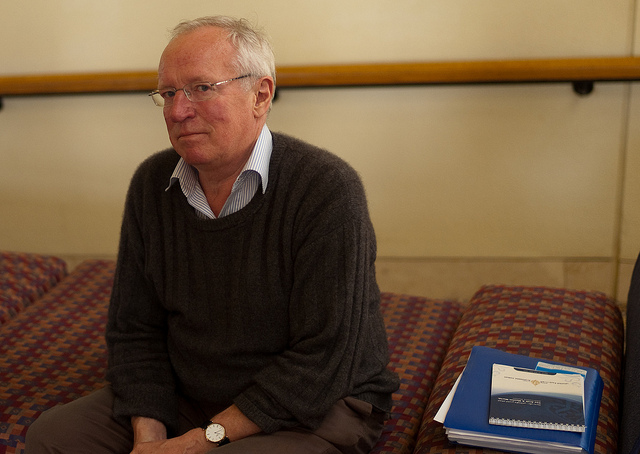Like this article? rabble is reader-supported journalism. Chip in to keep stories like these coming.
The award-winning journalist Robert Fisk is a rare breed. A lover of the English language, his reporting and analysis of the world’s hotspots cannot resist going after the Orwellian phrases and talking points that are the stock-and-trade of the world’s most awful politicians and tyrants.
And, readers can take great delight in his savaging of Stephen Harper and his “weird Conservative government,” in terms of its miserly approach towards the Syrian refugee crisis.
Fisk is back in Canada on a cross-Canada speaking tour focused on Syria’s civil war, which he has closely covered, the flight of its refugees through Europe, the rise of Islamic State and the west’s reaction to it, courtesy of the Canadians for Justice and Peace in the Middle East.
The migration of hundreds of thousands of desperate Syrian people through the south and east of Europe for hopefully friendlier territory further north in the EU is a new phenomenon that cannot be halted by walls and the re-establishment of border controls by panicky national governments, Fisk told rabble.ca in a recent interview.
Fisk covered the violent breakup of Yugoslavia during the 1990s and discovered first hand the mountainous terrain that snakes through the Balkans into Greece, which makes it very hard to completely wall off one country from another.
“Have you ever been to Croatia? I managed to cross it during the Bosnian war and manage to re-cross it. Nobody ever found out. You cannot close these borders,” he says.
Fisk also chatted with some of the fleeing Syrians on the Greek-Macedonian border. He discovered first hand a universal desire among them to live somewhere else, whether it is Germany or maybe Canada if they can get there.
“One of these guys from Aleppo [Syria] whom I know by chance told me ‘we are going to Germany. We don’t care how many frontiers [we have to cross],'” he reports.
“These people are refugees; they are genuine. But they have no intention of going back and rebuilding the new Syria.”
Fisk recalls being told by one UN official that at least a third of the refugees from a Middle East conflict never return to their homes.
This is unlike the Bosnians upon the end of the 1990 Yugoslavian war who did return to their homes once peace came to their split up country, Fisk remarks.
This is a segue into Fisk’s favourite subject, which is how the west’s politicians and much of its mainstream media often gets it wrong about the Arab world.
He sees a glimmer of hope in the decision by the Russians to militarily intensify their support for the current Syrian government in Damascus, which is headed by the controversial president Bashar Hafez al-Assad. That decision has upped the ante and forced the Americans to start a dialogue with Moscow on shared interests in the Middle East.
Fisk argues that this stream of refugees pouring into Europe may be slowed down if a peace deal of some sort is reached in Syria, with the involvement of the U.S., Iran (another Assad ally) and Russia. And these countries can turn their attention towards supporting Syria’s Assad against ISIS, he says.
“At least we would create an environment in which some people can stay in their homes and live a life which is what we are talking about,” states Fisk.
He admits such a deal would be realpolitik in nature and thus not provide the suitable justice for the peaceful demonstrators who were brutally suppressed by Assad’s armed men in cities across Syria in 2011 during the Arab Awakening. It is this government’s helicopter pilots that are targeting rebel held areas with barrel bombing.
Furthermore, such a deal has to be constructed, instructs Fisk, on the implicit understanding that the Russian president, Vladimir Putin will never give up on his man in Syria, Assad, just as the U.S. will always back Egypt’s increasingly authoritarian Abdel Fattah el-Sisi who came to power in a military coup, or Israeli president Benjamin Netanyahu who returned to power.
What the Russians and Americans share is a fear and revulsion for a much worse enemy in ISIS which continues to maintain a firm hold on large swaths of territory in Iraq and Syria despite an ineffectual NATO aerial bombing campaign which have included Canadian pilots, says Fisk.
“If you can bring in the Russians and the Americans on Syria, there is a path towards an end of the war. That does not mean a just ending of the war. It does not mean the end of Assad,” says Fisk.
But he observes it would mean the strengthening of the Syrian military (including its army, pilots and militia) that remain the only substantial force left in Syria in face of ISIS and its allies such as the al–Nusra Front, another extremist Islamist rebel force.
Syria’s military, which includes its army and militias, has lost about 53,000 soldiers out of a total of 150,000 armed men, he estimates.
So it is not surprising that Russia is providing the Syrian forces with items like long-range missiles to target the columns of suicide bombers launched by ISIS which have overwhelmed Assad’s military positions such as Palmrya where ISIS has with great publicity and zeal destroyed the ancient temples.
“I have been going to Syria for six to nine years now. I have access into the Syrian army. They are not going away. The Syrian army has war criminals; I don’t have any doubt about that but these are soldiers who will hang on. They will fight and they have.”
Fisk also maintains that the Russians will stick to training and support for the Assad government but not engage its own soldiers in the war with ISIS and its allies.
Paul Weinberg is a Hamilton-based freelance writer who can be reached at [email protected].
Photo: flickr/ Mohamed Nanabhay



